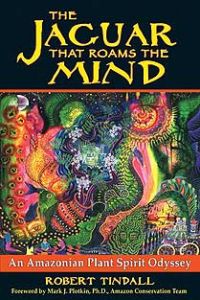'The Jaguar that Roams the Mind: An Amazonian Plant Spirit Odyssey' is the latest in a series of books dedicated to bringing the joys of ayahuasca shamanism to the mainstream West.The author, Robert Tindall, falls prey to most of the cliches we've come to expect from this genre: An educated Westerner; abandoned by parents at a young age; seeking spiritual insights from other cultures; travels the world in search of answers; goes on a hero's journey to find the wise old shaman who will show him the way; comes to find his true self, the jaguar within, and the root of all healing; and so on. But even though the journey is predictable and full of the kind of eyes-wide-open travelogue details that highlight the author's initial naivete, Tindall manages to pack a decent amount of research into this book and comes out with some analysis that goes beyond the typical "magic of the plant spirits" hocus pocus.
What I found most useful from this book was Tindall's comparisons of the various contexts and ceremonies where ayahuasca is being used in South America today. Stumbling from urban garage gurus to organized churches to varying levels of remote jungle clinics and tribal groups, Tindall comes to realize that traditional healing is not magic but instead the interaction of purging, psychoactive visions, and dietary restrictions. While still couching analysis in the traditional paradigm of plant spirits and communion with spirit visions, Tindall manages to step back occasionally and look closer at the catalytic biological processes brought on by the medicine and how the shaman utilizes the ceremony to bring patients to life-changing realizations about themselves. The book is awash in metaphorical digressions about the healing power of catharsis and creation, the toxic powers of confusion and insecurity, the transformational power of purging doubt and choosing your own reality, but what kind of a shamanic journey would it be without the metaphorical self-awakening of a lost young man finding the soul of a jaguar lurking inside? Tindall may be making up the journey as he goes along, but he still manages to hit all the right notes.
Since this book is mainly a psychoactive travelogue and not an ethnographic treatise it does tend to wander through Tindall's own "healing journey" with everything viewed through the prisms of searching Christian mysticism, the artful precision of Eastern martial arts, or the down-home shamanic reverence for spirit wisdom in all forms. At times Tindall bounces back and forth from confused acolyte to spiritual teacher; patient to shaman; seeker to the man with all the answers, but it is not done in a deliberate or condescending way, it is merely the narrative of his own process of awakening. The descriptions of people and places along the way are artfully cast and the spiritual wisdom never gets so New Agey as to become cloying; for that alone I respect Tindall's journey and hope this text can shed some positive light for others seeking the Amazonian spirit quest.
---
The Jaguar that Roams the Mind: An Amazonian Plant Spirit Odyssey: Robert Tindall, Mark J. Plotkin: Books






















There is one minor thing that i've found, while trawling through the internet about Ayahuasca. There is a frequently stated belief that Ayahuasca cures cancer, and the example most often used is that of Professor Emeritus Donald Topping, and no one has bothered to look into this example. I did, and have found out, to my disappointment, that Professor Topping died of cancer in June 2003. He was not cured of cancer by Aya., and i'm sorry to tell you this.
Susana Bustos' book "The healing power of the Icaros, A Phenomenological Study of Ayahuasca Experiences", quoted in Ch. #2, page 36,footnote #4, used Professor Toppings research, i believe, to support this belief. (He wrote of his experience with Aya. on the MAPS.org website), here's the link:[link]
I only write about this, because i don't want us to be misled by our own false hopes. The destruction of a false hope feels as painful as the destruction of true hope, and i don't want any of you to go through that. Screw false hopes.
The reason that i'm interested in Ayahuasca use, is that i'm being treated for depression and other stuff. I've read that Aya. can relieve depression or even cure it. (Is that my false hope showing)? Also, a few researchers have stated that Aya. use in a religious/spiritual setting, has helped alcoholics and addicts to a large degree. The only interest that i have for Aya. is to attempt a CURE for Depression or other mental illnesses.
I love this book, and found it in my public library. Thank you for writing this book, Mr Tindall!
Sincerly, Scott B.
I enjoyed the book, respect the authors journey.
The Invisible College comes in two flavors... PDF and Print. Free PDF Versions: [link]
Paper Versions: [link] We are going to print soon with the 5th edition.
I will contact you, over at your Blog. Maybe we have lots to talk about. Blessings,
Gwyllm
I could just order and do it at home, but something tells me that having your ego explode into a million pieces while sitting your own puke in a small inner-city apartment all the while the pressures of daily life tugging at the back of my mind is not a good idea. In the long term, sure, I can see myself doing it in a Western setting, but at least the initial introduction to it, where I see myself head-on crashing into the major healing obstacles, would probably pan out better for me in some jungle hut with experienced facilitators around. Guys, this bugs me so much right now, not being able to go while constantly reading about on people's transformative experiences. :(
The comments posted here do not reflect the views of the owners of this site.